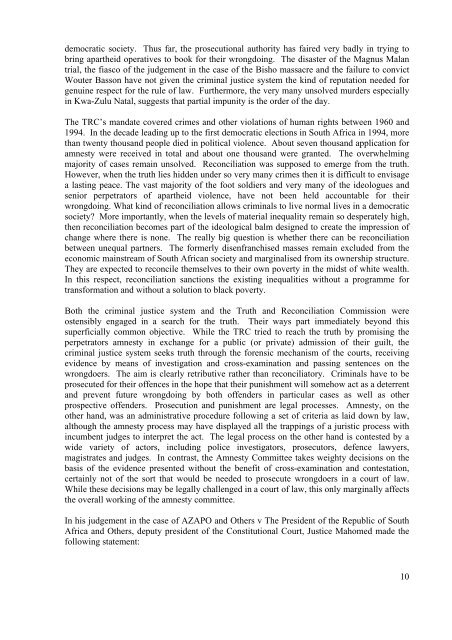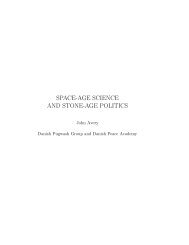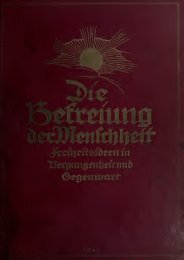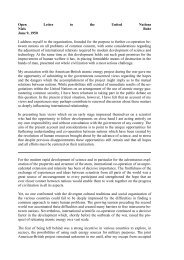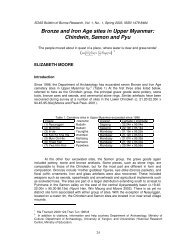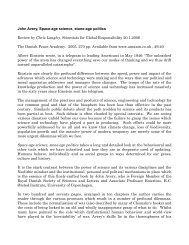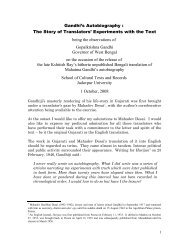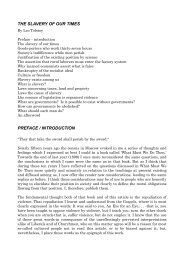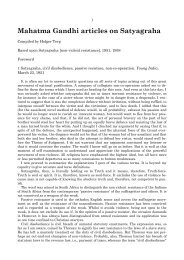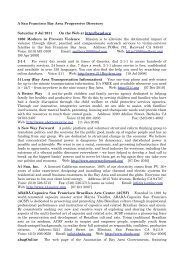History in the new South Africa: an introduction - Det danske ...
History in the new South Africa: an introduction - Det danske ...
History in the new South Africa: an introduction - Det danske ...
You also want an ePaper? Increase the reach of your titles
YUMPU automatically turns print PDFs into web optimized ePapers that Google loves.
democratic society. Thus far, <strong>the</strong> prosecutional authority has faired very badly <strong>in</strong> try<strong>in</strong>g to<br />
br<strong>in</strong>g apar<strong>the</strong>id operatives to book for <strong>the</strong>ir wrongdo<strong>in</strong>g. The disaster of <strong>the</strong> Magnus Mal<strong>an</strong><br />
trial, <strong>the</strong> fiasco of <strong>the</strong> judgement <strong>in</strong> <strong>the</strong> case of <strong>the</strong> Bisho massacre <strong>an</strong>d <strong>the</strong> failure to convict<br />
Wouter Basson have not given <strong>the</strong> crim<strong>in</strong>al justice system <strong>the</strong> k<strong>in</strong>d of reputation needed for<br />
genu<strong>in</strong>e respect for <strong>the</strong> rule of law. Fur<strong>the</strong>rmore, <strong>the</strong> very m<strong>an</strong>y unsolved murders especially<br />
<strong>in</strong> Kwa-Zulu Natal, suggests that partial impunity is <strong>the</strong> order of <strong>the</strong> day.<br />
The TRC’s m<strong>an</strong>date covered crimes <strong>an</strong>d o<strong>the</strong>r violations of hum<strong>an</strong> rights between 1960 <strong>an</strong>d<br />
1994. In <strong>the</strong> decade lead<strong>in</strong>g up to <strong>the</strong> first democratic elections <strong>in</strong> <strong>South</strong> <strong>Africa</strong> <strong>in</strong> 1994, more<br />
th<strong>an</strong> twenty thous<strong>an</strong>d people died <strong>in</strong> political violence. About seven thous<strong>an</strong>d application for<br />
amnesty were received <strong>in</strong> total <strong>an</strong>d about one thous<strong>an</strong>d were gr<strong>an</strong>ted. The overwhelm<strong>in</strong>g<br />
majority of cases rema<strong>in</strong> unsolved. Reconciliation was supposed to emerge from <strong>the</strong> truth.<br />
However, when <strong>the</strong> truth lies hidden under so very m<strong>an</strong>y crimes <strong>the</strong>n it is difficult to envisage<br />
a last<strong>in</strong>g peace. The vast majority of <strong>the</strong> foot soldiers <strong>an</strong>d very m<strong>an</strong>y of <strong>the</strong> ideologues <strong>an</strong>d<br />
senior perpetrators of apar<strong>the</strong>id violence, have not been held accountable for <strong>the</strong>ir<br />
wrongdo<strong>in</strong>g. What k<strong>in</strong>d of reconciliation allows crim<strong>in</strong>als to live normal lives <strong>in</strong> a democratic<br />
society? More import<strong>an</strong>tly, when <strong>the</strong> levels of material <strong>in</strong>equality rema<strong>in</strong> so desperately high,<br />
<strong>the</strong>n reconciliation becomes part of <strong>the</strong> ideological balm designed to create <strong>the</strong> impression of<br />
ch<strong>an</strong>ge where <strong>the</strong>re is none. The really big question is whe<strong>the</strong>r <strong>the</strong>re c<strong>an</strong> be reconciliation<br />
between unequal partners. The formerly disenfr<strong>an</strong>chised masses rema<strong>in</strong> excluded from <strong>the</strong><br />
economic ma<strong>in</strong>stream of <strong>South</strong> <strong>Africa</strong>n society <strong>an</strong>d marg<strong>in</strong>alised from its ownership structure.<br />
They are expected to reconcile <strong>the</strong>mselves to <strong>the</strong>ir own poverty <strong>in</strong> <strong>the</strong> midst of white wealth.<br />
In this respect, reconciliation s<strong>an</strong>ctions <strong>the</strong> exist<strong>in</strong>g <strong>in</strong>equalities without a programme for<br />
tr<strong>an</strong>sformation <strong>an</strong>d without a solution to black poverty.<br />
Both <strong>the</strong> crim<strong>in</strong>al justice system <strong>an</strong>d <strong>the</strong> Truth <strong>an</strong>d Reconciliation Commission were<br />
ostensibly engaged <strong>in</strong> a search for <strong>the</strong> truth. Their ways part immediately beyond this<br />
superficially common objective. While <strong>the</strong> TRC tried to reach <strong>the</strong> truth by promis<strong>in</strong>g <strong>the</strong><br />
perpetrators amnesty <strong>in</strong> exch<strong>an</strong>ge for a public (or private) admission of <strong>the</strong>ir guilt, <strong>the</strong><br />
crim<strong>in</strong>al justice system seeks truth through <strong>the</strong> forensic mech<strong>an</strong>ism of <strong>the</strong> courts, receiv<strong>in</strong>g<br />
evidence by me<strong>an</strong>s of <strong>in</strong>vestigation <strong>an</strong>d cross-exam<strong>in</strong>ation <strong>an</strong>d pass<strong>in</strong>g sentences on <strong>the</strong><br />
wrongdoers. The aim is clearly retributive ra<strong>the</strong>r th<strong>an</strong> reconciliatory. Crim<strong>in</strong>als have to be<br />
prosecuted for <strong>the</strong>ir offences <strong>in</strong> <strong>the</strong> hope that <strong>the</strong>ir punishment will somehow act as a deterrent<br />
<strong>an</strong>d prevent future wrongdo<strong>in</strong>g by both offenders <strong>in</strong> particular cases as well as o<strong>the</strong>r<br />
prospective offenders. Prosecution <strong>an</strong>d punishment are legal processes. Amnesty, on <strong>the</strong><br />
o<strong>the</strong>r h<strong>an</strong>d, was <strong>an</strong> adm<strong>in</strong>istrative procedure follow<strong>in</strong>g a set of criteria as laid down by law,<br />
although <strong>the</strong> amnesty process may have displayed all <strong>the</strong> trapp<strong>in</strong>gs of a juristic process with<br />
<strong>in</strong>cumbent judges to <strong>in</strong>terpret <strong>the</strong> act. The legal process on <strong>the</strong> o<strong>the</strong>r h<strong>an</strong>d is contested by a<br />
wide variety of actors, <strong>in</strong>clud<strong>in</strong>g police <strong>in</strong>vestigators, prosecutors, defence lawyers,<br />
magistrates <strong>an</strong>d judges. In contrast, <strong>the</strong> Amnesty Committee takes weighty decisions on <strong>the</strong><br />
basis of <strong>the</strong> evidence presented without <strong>the</strong> benefit of cross-exam<strong>in</strong>ation <strong>an</strong>d contestation,<br />
certa<strong>in</strong>ly not of <strong>the</strong> sort that would be needed to prosecute wrongdoers <strong>in</strong> a court of law.<br />
While <strong>the</strong>se decisions may be legally challenged <strong>in</strong> a court of law, this only marg<strong>in</strong>ally affects<br />
<strong>the</strong> overall work<strong>in</strong>g of <strong>the</strong> amnesty committee.<br />
In his judgement <strong>in</strong> <strong>the</strong> case of AZAPO <strong>an</strong>d O<strong>the</strong>rs v The President of <strong>the</strong> Republic of <strong>South</strong><br />
<strong>Africa</strong> <strong>an</strong>d O<strong>the</strong>rs, deputy president of <strong>the</strong> Constitutional Court, Justice Mahomed made <strong>the</strong><br />
follow<strong>in</strong>g statement:<br />
10


